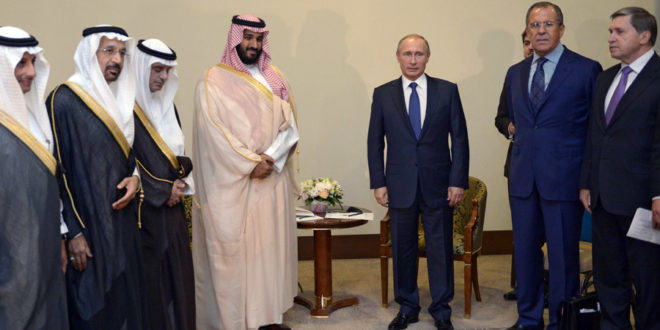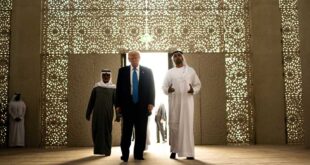By Shehab Al Makahleh • Follow @ShehabMakahleh
A week into historic arms deal reached with the US worth $110 billion, Saudi deputy crown prince and defense minister, Mohamed bin Salman, will visit Moscow. Crises in Syria, Libya and Yemen, as well as Saudi investment opportunities in Russia will likely top the agenda between the Saudi prince and the Russians, along with oil talks and inter-faith dialogue after the formation of the anti-terrorist center in Riyadh which would incorporate cooperation between countries in charge to share intelligence information.
US president Donald Trump just left Saudi Arabian capital, in his first foreign trip, after closing an historic arms deal worth $110 billion in addition to other Saudi investments in the US and securing number of high value contracts for select US companies tasked with implementing bold economic reform policy ― Vision 2030. The total cumulative value of the Saudi-US deals over the next 10 years is expected to be around $400 billion.
The US arms deal in particular is aimed to give credit to the Deputy Crown Prince as a defense minister whose ministerial mandate has him embroiled in an unwinnable war in Yemen, which is fast draining national reserves, amidst recession triggered by the low oil prices.
In Riyadh, Trump met with the heads of the Saudi royal family, the GCC leaders and the heads of other 55 Arab and Muslim states, in an attempt to form a new anti-terrorist and military alliance to curb Iran’s influence in the region. The alliance ― under the US guidance ― is expected to serve the role of the Arab NATO, as Trump seeks to deliver on his campaign promises ― to make the allies pay for their own security. Clearly, the latest of Trump’s deals is indeed making the Saudis pay dearly. Whether the ‘Arab NATO’ alliance will provide the security it promises, remains to be seen.
The fears of conflict escalation and more Middle East wars have been voiced by many, in particular due to the Riyadh Summit strong condemnation of Iran as the key state sponsor of terrorism and the destabilizing force in the Middle East.
Saudi Deputy Crown Prince Mohamed bin Salman is believed to be the man behind the arms deal and the key spokesperson against Iran, as his recent interview with Al-Arabiya proves, where he threatened Iran with taking war to Tehran and dismissed the idea of negotiating with the Iranian regime. Iranian officials, including the Foreign Minister Zarif and the re-elected president Rouhani, on the other hand, have called for Gulf States’ closer collaboration in economic and security spheres, and turning the Gulf into the ‘Sea of Friendship’, while urging the western countries to stop meddling in the Middle Eastern affairs.
Following the media reports on US-Saudi Summit outcomes, Russian officials declined to comment on the arms deal, stating that the US-Saudi relations are the business of the two countries, while Russian own relations with the Saudi state are a separate matter.
As the Deputy Crown Prince is readying for the Moscow visit next week, political and media analysts are wondering about the main objectives of this visit. Most believe that the key topics would be joint steps towards resolution of crises in Syria, Libya and Yemen, in addition to bolstering economic and investment cooperation between the Saudi and Russian states. Joint counterterrorism efforts and the supplies of Russian weapons are also likely to be discussed.
Mid-last month, a high level Russian delegation headed by the Chairman of the Federation Council Valentina Matviyenko has visited Riyadh, to discuss bolstering international joint efforts in the fight against terrorism. According to media reports, the Russians were satisfied with the meeting, although the disagreement about Syria remained unresolved.
The upcoming Saudi royal visit to Moscow is a first leg of the Deputy Crown Prince’s European tour, which would include visits to the UK and France. In the context of Russian relations the visit is a response to the Russian delegation visit to Riyadh last month that sought common ground with Saudis in the counterterrorism fight in the Middle East and globally. The stumbling stone in the upcoming meeting is expected to be Iran, its role in the anti-terrorist fight in Syria and Iraq, and the aftermath of the terrorist defeat in the two Arab countries.
The Russian delegation’s visit to Riyadh last month took place during the Great Lent, just before Easter, while the Saudi delegation will visit Moscow during its Muslim equivalent ― the Ramadan fast. This is a symbolic gesture as the visit is going to include discussions about inter-faith dialogue, and the visit to the grand mosque in Moscow, ceremonially opened by the Russian president Putin two years ago, where he was flanked by Turkish president Erdogan.
Saudis are certainly going to ask Russia for concessions in its support for Iran, in exchange for more Saudi investments in diverse sectors of Russian economy. But the likelihood of Russia abandoning its Persian ally at this moment, or anytime soon is a pipe dream, in particular as Russia seeks to end Middle Eastern conflicts, rather than escalating them. Ideally, Russian diplomats might succeed in persuading the Saudis that peace is better than war, and help foster friendly relations between the two Gulf archrivals.
Following the Riyadh Summit an important yet underreported meeting of high-level security officials was held in Zavidovo, in Russia. Of special importance is the quadripartite meeting of Russian, Iranian, Iraqi and Syrian heads of security and intelligence services, Nikolai Patrushev, Ali Shamkhani, Faleh Fayyad, and Ali Mamlook who met to discuss scenarios and responses to the US-Saudi initiative and the regional security.
Just weeks before Iran’s presidential elections, Russian FM Sergei Lavrov announced that Russia is ready to accept Iran’s accession to the Shanghai Cooperation Organization (SCO), following lifting of the Iran sanctions. As a key state in the control of crucial Indian Ocean choke point of Strait of Hormuz, Iran is too valuable a partner in military-security and economic spheres to the Russia-China duo, and this cooperation is likely to intensify with the Chinese “Belt and Road” project. Moreover, just few days ago Russia has announced the plan to create a temporary free trade zone between Eurasian Economic Union (EAEU) and Iran, as a prelude to a permanent free trade zone.
So why would the Saudi Deputy Crown Prince, so sure of the success of the Arab NATO and the big arms deal just concluded with the US need Russia onboard? Could it be that something else is happening behind the scenes? Although the Saudi media spared no effort to present the Riyadh Summit as a great success, the fact remains that not all Arab states are in symphony regarding the goals of the announced alliance.
Egypt, for one, has stated that it did not support the Arab NATO’s engagement in the Syrian conflict. More so, because Egypt has recently sent its own troops to support Syrian Army in its anti-terrorist fight, and has itself problems with Islamist terrorism in the Sinai and along the Libyan border. In the Gulf proper, the rift with Qatar seems to be deepening in the recent days, with two key Arab Gulf states ― Saudi Arabia and the United Arab Emirates with information war against Qatar, accusing it of supporting and sponsoring terrorist groups, including Muslim Brotherhood and al-Qa’ida affiliates in Syria and Iraq. The two leading Arab Gulf powers have also blocked access to the Qatari main media house, Al-Jazeera – a move Qatar decried as unjust.
While Riyadh Summit aimed to show Saudi leadership of the Arab world, the outcomes of the Deputy Crown Prince’s deals with the US, Russia, and other regional and global powers and their impact on the Saudi economy will ultimately decide on the country’s future trajectory. The warpath on which the defense minister is betting is the worst possible option for the whole region. Could Russians pull a trump card to pacify the Saudi Prince ― that is the question!
 Geostrategic Media Political Commentary, Analysis, Security, Defense
Geostrategic Media Political Commentary, Analysis, Security, Defense





